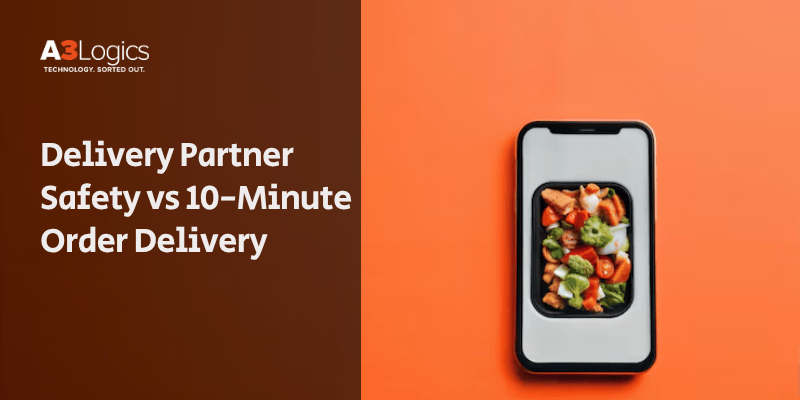


This article explores the challenges delivery partners face daily and why the industry must prioritize their safety over speed.
Quick delivery is not possible without delivery partners who navigate traffic, weather, and road conditions to meet tight deadlines. While the technology behind the apps continues to evolve, the basic infrastructure—roads, traffic systems, and city planning—remains the same. As a result, delivery partners are often left to absorb the risk of fast delivery promises.
These challenges are not just operational but deeply human. From health risks to financial uncertainty and emotional burnout, the food delivery partner challenges deserve a closer and more compassionate look.
One of the most pressing delivery partner security issues is the high risk of road accidents. To meet 10-minute delivery targets, riders often feel compelled to speed or ignore traffic signals. This creates dangerous situations, especially in cities with poor road infrastructure.
Even experienced riders are vulnerable when rushing through traffic or navigating crowded streets. The physical toll of continuous riding, combined with the pressure to be fast, increases the chances of injury or fatal accidents. The system unintentionally encourages risk-taking behavior just to shave off a few minutes.
While some platforms provide basic helmets, many delivery partners still lack adequate safety gear like reflective jackets, gloves, raincoats, or knee pads. This puts them at higher risk during night shifts or in bad weather.
In many cases, delivery partners have to purchase safety equipment themselves, which adds to their financial burden. Without proper gear, even minor accidents can lead to serious injuries. This lack of essential protection exposes a major gap in how companies prioritize delivery partner security.
Most quick delivery apps use GPS tracking and real-time updates to ensure fast and efficient delivery. While helpful for customers, this constant surveillance adds another layer of stress for delivery partners. They know they are being watched and timed every second of the way.
The rise of quick commerce has led to inconsistent and often unpredictable schedules for delivery partners. Peak hours can stretch long into the night, and there is no certainty about how many orders they’ll get or how far they’ll need to travel.
Many delivery partners start their jobs with minimal or no training. They are often unaware of safety protocols, customer service etiquette, or how to handle unexpected situations. In the context of fast delivery, this becomes a major challenge.
Long hours on the road, irregular meal times, and exposure to pollution all contribute to poor health outcomes for delivery partners. The 10-minute delivery model intensifies these challenges, leaving little time for breaks or even a simple meal.
In many quick delivery platforms, delivery partners are classified as independent contractors, which often excludes them from company-provided insurance benefits. This becomes a major concern in case of accidents, especially when they happen during deliveries.
Delivery partners sometimes face threats while on the job, especially during late hours or in isolated areas. There have been multiple reports of riders being robbed, assaulted, or harassed while trying to complete deliveries.
These incidents are deeply disturbing and highlight the urgent need for security measures. Panic buttons in apps, emergency helplines, and route-based risk assessments can help, but many platforms still lack a proper safety protocol. Physical safety is non-negotiable in ensuring delivery partner security.
Customer feedback plays a crucial role in how delivery partners are evaluated. But sometimes, partners face verbal abuse or false complaints from customers, especially if there’s a minor delay. The fear of receiving low ratings or being penalized for things beyond their control adds emotional stress to an already demanding job.
When delivery partners face emergencies—accidents, sudden illness, or bad weather—they often have no clear support system. Delays caused by such situations can still result in income loss, penalties, or account deactivation.
Any responsible food delivery app development company or mobile app development company must recognize that delivery partners are not just cogs in a system—they are people with families, aspirations, and limits. When we talk about food delivery partner challenges, we must remember that behind each order is a person navigating tough roads, long hours, and increasing pressure.
